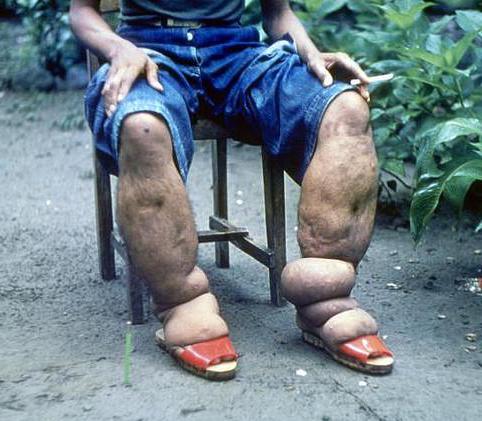At WiseGEEK, we're committed to delivering accurate, trustworthy information. Our expert-authored content is rigorously fact-checked and sourced from credible authorities. Discover how we uphold the highest standards in providing you with reliable knowledge.
What Are the Different Types of Elephantiasis Treatment?
There are multiple options for elephantiasis treatment including antibiotic drugs, strict cleaning regimes, and exercise. Also known as lymphatic filariasis, there has not been a cure for the condition, but its symptoms have been treated with some success. Elephantiasis treatment tends to focus on two things: treating infection and improving the flow of lymph. Mosquito control is a common method of addressing the condition in areas where it is endemic, as the insects carry the worms that cause the problem.
One of the most common methods of elephantiasis treatment is the administration of antibiotics. These drugs can treat symptoms of the condition by killing the worms in the lymphatic system that cause excessive swelling in the limbs and genitals. A dose of albendazole, combined with diethylcarbamazine citrate or onchocerciasis has been administered to individuals in areas where the condition is common. The specific drug combination depends on what other factors in the geographical area contribute to the proliferation of elephantiasis.

In addition to being an effective elephantiasis treatment for current symptoms, drugs can be used as a preventative measure. They have been given to large populations in at-risk areas in order to control the disease. Drugs can also slow the progression of the disease so that it does not disable the patient. Medicated creams may also be used on a regular basis to treat cuts and scrapes in the affected area, as these can worsen the condition dramatically.

Regular, thorough cleaning of the affected area is another common method of elephantiasis treatment. Washing with soap and clean water two times a day typically encourages significant improvement in symptoms. It is also advisable to keep these areas dry and clean and to wear comfortable shoes.
Restoring the flow of lymph through the limbs is an important element of reducing swelling. Once worms in the lymph nodes have been killed, regular movement and massage of the area can help to restore function. Raising the affected area can also help to move fluid to other parts of the body.

There are preventative measures that have often reduced the incidence of elephantiasis in areas where it was endemic. Effective mosquito control is typically the primary method used to control outbreaks of the condition, as the insects carry roundworm larvae which is then transferred to human hosts via their bite. It is also believed that the condition can be caused by regular contact with the irritants in substances such as red clay and matter that contains silica.
AS FEATURED ON:
AS FEATURED ON:













Discussion Comments
i have been elephantitic for the past 25 years and now I am 39 with four children. None of them has inherited my illness, thanks be to God. I live positively, hoping that one day the Lord will answer my prayers.
I think it's interesting that just keeping the area clean can cut down on the symptoms of elephantiasis. That seems like it would be fairly easy, but I imagine the area is pretty sensitive too. I guess you would just have to clean it very gently.
I'm also not surprised that moving around and massaging the area can help. After all, elephantiasis is caused by a blockage in the lymph nodes. So anything that will get the lymph moving again will probably help with the symptoms.
@JaneAir - That makes sense to me too. I also think that there are different ways to prevent the different elephantiasis symptoms, too. Like the article said, in areas where people are susceptible to this because of mosquito bites, they can try to cut down the mosquito population or give preventative antibiotics to people.
I guess there's really no way to prevent hereditary elephantiasis though. I suppose if one parent has it, you could always do genetic testing to see what about the likelihood of having a child with the disorder. Then the couple could decide whether to have their own children or adopt.
I had no idea there was no cure for elephantiasis. How awful! I guess it's good that there is some type of treatment for the symptoms, but hopefully they will come up with a cure at some future time.
Anyway, it stands to reason the treatment and prevention might be different for different cases, because there are a few elephantiasis causes. From what I understand it can be causes by parasites, chemical buildup, or simply be hereditary. Obviously you would treat each case differently.
For example, treating someone who has a hereditary case with antibiotics probably wouldn't be very effective!
Post your comments